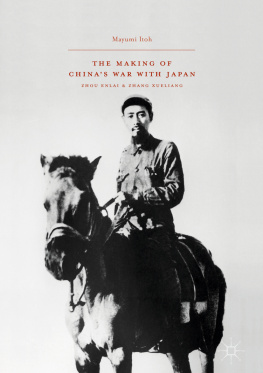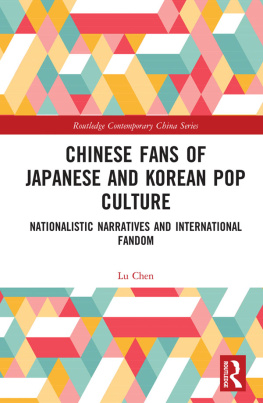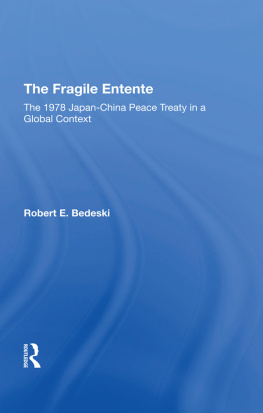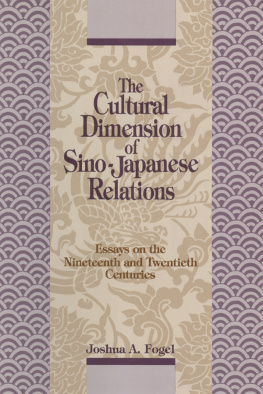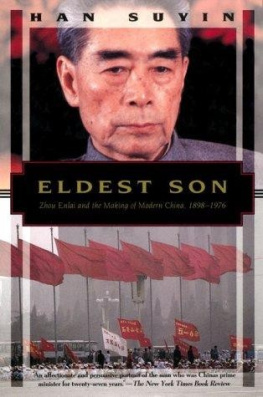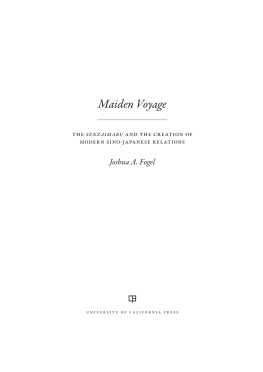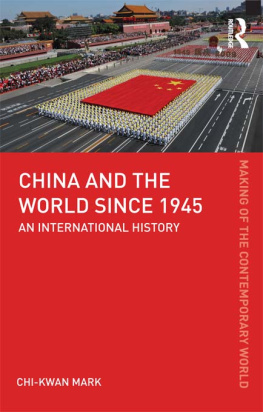Japan occupied an important part of the life of Zhou Enlai (March 1898January 1976) from his birth to death. He was born just after the first Sino-Japanese War (18941895) and grew up in the middle of the Russo-Japanese War (19041905), in which the two countries vied for the spheres of influence in Manchuria (Chinas Northeast region). Zhou went to an elementary school in the former capital of Manchuria, Fengtian (current Shenyang), and observed the effects of the war. Zhou then studied at Nankai Middle School in Tianjin, where a Chinese militia group had besieged international legations of the imperial powers, including Japan (the Boxer Rebellion, 18991901). After graduating from Nankai Middle School, Zhou went to study in Japan in September 1917, was enlightened about communism, and returned home in April 1919.
Upon returning to Tianjin, Zhou participated in the May Fourth Movement, the first nationwide popular uprising of nationalism in China, was arrested, and was expelled from Nankai University. Zhou then went to Europe in November 1920 and joined a Chinese communist cell in France in the spring of 1921. Thus, a young Chinese revolutionary and future leader of the Peoples Republic of China (PRC or China hereafter) was born. Zhou returned to China and moved up the ranks in the Communist Party of China (CPC), while fighting the Beiyang warlords during the first United Front between the Chinese Nationalist Party (KMT) and the CPC. The CPC then fought the KMT, ruled by Chiang Kai-shek (October 1887April 1975), and then the Imperial Japanese Army (IJA) until winning the war with Japan (the second Sino-Japanese War, 19371945), and the civil war in 1949. After the establishment of the PRC, Zhou dealt with Japan as the Chinese premier (and foreign minister) until his death in 1976. Thus, from his impressionable years and throughout his adult years, Zhou lived a life concerned with Japan, dealing with Japan, or fighting with Japan.
This work constitutes part two of a three-part study of Zhou Enlai and Japan by this author. Part one examined Zhous involvement with Japan during his early years and investigated his study years in Japan. Part two in turn analyzes Zhous relations with Japan during his mid-career, from his participation in the May Fourth Movement and his years in Europe to his involvement in the Xian Incident and the formation of the second United Front between the KMT and the CPC against Japan, which paved the way for the Chinese victory in the second Sino-Japanese War.
Literature Review
Early Career of Zhou Enlai
Despite the significance of Zhous involvement in the May Fourth Movement and his activities in Europe, this formative period of Zhous career is not well documented in his biographies in English. Zhou Enlai : A Biography by Dick Wilson (1984) and Zhou Enlai : The Early Years by Chae-jin Lee (1994) have chapters on this period; however, they are relatively short and contain misunderstandings. In turn, a Japanese diplomat, Ogura Kazuo, wrote a more reliable book in Japanese on Zhous life in Europe entitled Pari no Sh Onrai : Chgoku-kakumeika no Sei-taiken (Zhou Enlai in Paris: A Chinese Revolutionarys Experiences in Western Europe, 1992).
Meanwhile, the definitive official biography, Zhou Enlai zhuan (Biography of Zhou Enlai, the Official Biography hereafter), was published in China. The original one-volume version, covering his life until 1949, was first published in 1989. Then the new version, with the addition of the second volume covering his life from 1949 to 1976, was published in 1998. The actual content of volume one of the 1998 version is almost identical to that of the 1989 version, with major changes in the formatting of footnotes. Both versions were edited by the Central Committee of the CPC (CCCPC) Party Literature Research Office (the official name in English) and they clarify many misunderstandings and speculations made in the previous studies of Zhous life.
Zhou Enlai and the Xian Incident
In addition, the critical roles Zhou played in the Xian Incident of December 1936 and in the subsequent formation of the anti-Japanese united front between the KMT and the CPC are not well documented in English. Moreover, the Xian Incident itself is still shrouded in mystery, and the previous studies are fraught with misunderstandings, even wrongly speculating that it was a conspiracy of the CPC or of the Third International (Comintern, hereafter). The Official Biography of Zhou Enlai (1989 and 1998) and the Official Chronology of Zhou Enlai (1989) clarify these misunderstandings by providing more accurate accounts of Zhous involvement in the incident, as well as that of the CPC and the Comintern. Although they might not have disclosed everything, sources provided for each passage include specific telegrams exchanged among Zhou, Mao Zedong, other CPC leaders, and the Comintern headquarters, with specific dates.
In addition, one of the earliest biographies of Zhou Enlai in any language, written by Matsuno Tanio (1961), provides a credible account of the Xian Incident. Matsuno, a reporter for the major Japanese daily Asahi Shimbun , resided in Beijing for half a year until the end of August 1957, when he was forced to leave China, as a quid pro quo for the Japanese governments refusal to admit Chinese reporters to enter Japan. During his stay, Matsuno met Zhou many times and gathered information about him. Upon returning home, he wrote an excellent biography of Zhou up to the ten-year anniversary of the founding of the PRC. Although it was written more than half a century ago, it still sheds light on many important aspects of the Xian Incident and the secret missions Zhou engaged in for the peaceful settlement of the incident and on the formation of the second KMTCPC United Front.
Zhang Xueliangs Record of Repentance
In turn, the culprit of the Xian Incident, Northeastern Army commander-in-chief Zhang Xueliang (courtesy name, Hanqing, June 1901October 2001), wrote a report on the incident in 1954 (or 1955 or 1956, depending on the source) by order of Chiang Kai-shek, who had placed Zhang under house arrest since December 1936, transferring him to various places across China and then to Taiwan in 1947. Chiang later gave the report to his son, Chiang Ching-kuo. Then the whole account was leaked and was published as an article entitled Xi an-shibian chanhui-lu (Record of Repentance for the Xian Incident) in the journal Xiwang (Hope) in Taipei in July 1964. This caused a political storm and Zhang protested against the publication. Chiang Kai-shek in rage banned the journal, held Chiang Ching-kuo responsible, and punished those who were involved in the publication. Although most of the copies were recalled, some were smuggled to Hong Kong and republished in Mingbao (Light Report) in September 1968 (No. 3234).
Subsequently, this article was compiled in several collections of Zhangs writings published in China, under the title Xi an-shibian huiyi - lu (Memories of Xian Incident). Although this account is significant as the sole record of the incident written by Zhang himself, and appears to be accurate overall, it should be read with a grain of salt because it was written for Chiang by his order.
Oral History of Zhang Xueliang
Then in 1990, shortly after the Taiwanese government had rehabilitated Zhang and had given him a complete recovery of his freedom on his 90th birthday (according to the traditional Chinese age counting), Zhang gave an interview to the Japanese public broadcast station, NHK, in Taipei on June 17 and then on August 35, 1990. During the interviews, Zhang candidly spoke about his life and his views of Japan, such as Japan ruined my life. Soon, a translation of the interviews was published in China and caused a sensation there. In addition, Columbia University history professor, Tang Degang (August 1920October 2009), interviewed Zhang in JanuaryMay 1990 and the transcripts were compiled in Zhang Xueliang koushu-lishi (Oral History of Zhang Xueliang, 2009, 2013, and other versions). Then, Zhangs death in 2001 resulted in another surge in interest in Zhang in China, and a plethora of biographies of Zhang, as well as collections of his oral history and writings, were published in China.

